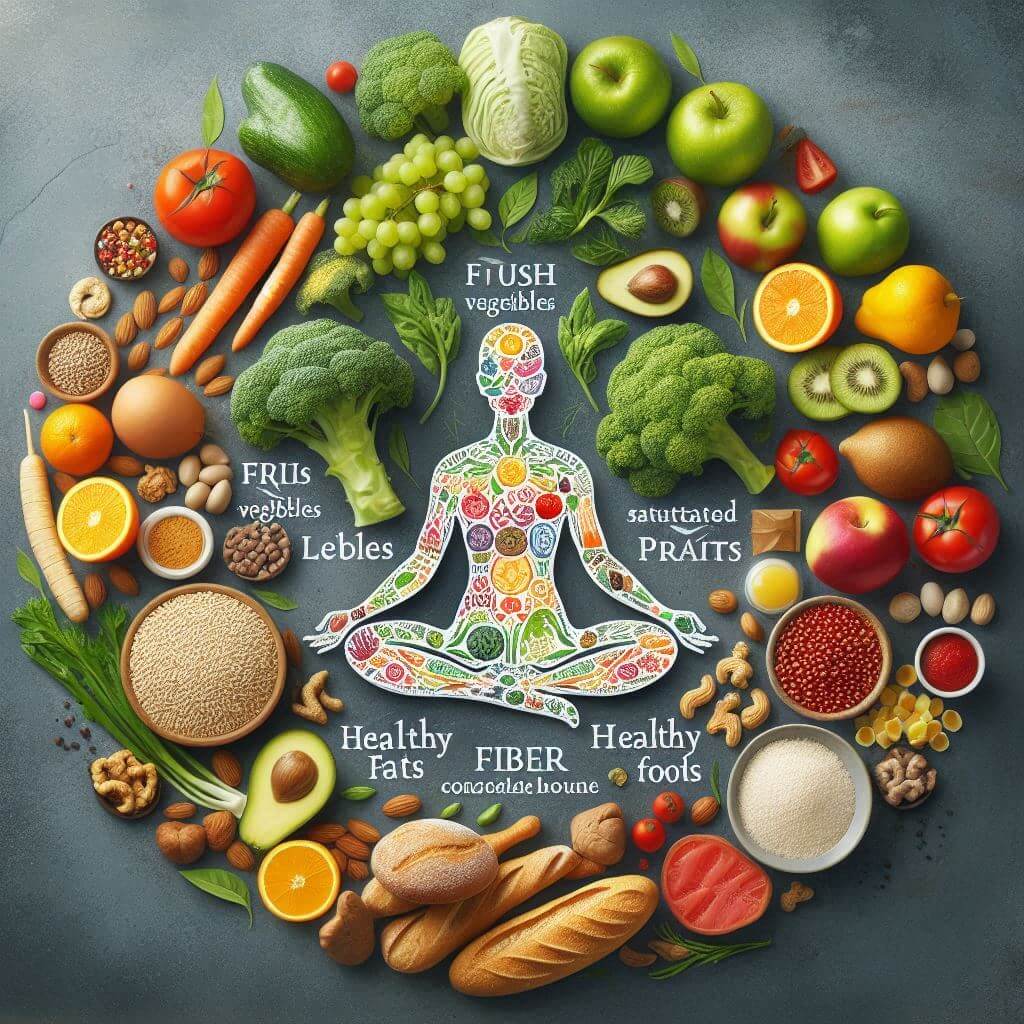The pursuit of a long and full life, permeated by health and vitality, has become a central goal for many people around the world.
In this context, the food emerges as one of the fundamental pillars to achieve this objective, playing a crucial role in promoting longevity and general well-being.
Science has already proven that a balanced, nutrient-rich diet contributes significantly to several aspects of health: The Importance of Nutrition for Longevity: Full PDF
Prevention of Chronic Diseases:
Heart disease, type 2 diabetes, hypertension and some types of cancer, which plague the world population, can be prevented or have their risks minimized through an adequate diet.
By choosing whole, nutritious foods, we provide our bodies with the nutrients they need to fight chronic inflammation, regulate blood sugar levels, keep blood pressure under control, and strengthen our immune system, reducing our susceptibility to these diseases.
Improved Cognitive Function:
The brain, the organ responsible for our mental functions, needs specific nutrients to function optimally.
A diet rich in B vitamins, omega-3, antioxidants and other essential nutrients ensures the supply of these nutrients, contributing to memory, concentration, intellectual abilities and preventing cognitive decline associated with aging.

Strengthening the Immune System:
A strong immune system is essential to fight diseases and infections, ensuring the body's defense against pathogens.
A diet rich in vitamins, minerals and antioxidants, such as vitamin C, zinc and beta-carotene, helps to strengthen the body's defenses, preventing flu, colds and other infectious diseases, as well as helping to recover more quickly in the event of illness.
Promoting Bone and Muscle Health:
Strong bones and healthy muscles are essential for mobility, independence and quality of life, especially in old age.
A proper diet provides the nutrients needed to maintain bone and muscle health over the years, such as calcium, vitamin D and proteins.
This ensures the prevention of diseases such as osteoporosis and sarcopenia, common in the elderly population, and contributes to an active and independent life.
Adoption of a Conscious Food Reeducation:
THE nutritional reeducation goes beyond following restrictive and temporary diets.
It is a process of learning and adapting to new eating habits, seeking a more conscious and balanced relationship with food.
It’s a path that takes time, effort, and persistence, but it offers valuable rewards for your overall health and well-being.
Some basic principles of nutritional reeducation include:

- Prioritize fresh, whole foods: Fruits, vegetables, whole grains, lean proteins and healthy fats should be the basis of the diet. These foods provide the body with essential nutrients for the proper functioning of all systems, in addition to being rich in fiber, which contributes to satiety and good intestinal function.
- Reduce consumption of processed foods: Foods high in added sugars, fats Saturated fats and sodium, found in fast food, processed foods and ultra-processed foods, should be consumed in moderation. Excessive consumption of these foods is associated with several health problems, such as obesity, heart disease, diabetes and some types of cancer.
- Practice portion control: Eating mindfully and paying attention to your body’s hunger and satiety signals is essential to avoid consuming excess calories. This helps maintain a healthy body weight and prevent the development of chronic diseases.
- Stay hydrated: Drinking plenty of water throughout the day is essential for the proper functioning of the body. Water helps regulate body temperature, transport nutrients and eliminate toxins.
Benefits of Healthy Eating for Longevity:
A nutrient-rich diet offers several benefits for longevity and overall health, positively impacting several aspects of life:
- Fighting free radicals: Antioxidants found in fruits, vegetables and other foods fight free radicals, unstable molecules that can damage cells and contribute to premature aging and the development of chronic diseases. Regular consumption of these foods helps protect cells and slow the aging process.
- Body weight control: Maintaining a healthy weight helps prevent obesity, a major risk factor for several chronic diseases, including heart disease, type 2 diabetes, some cancers, and joint problems. A balanced diet, combined with regular physical activity, contributes to weight control and maintaining a healthy body mass index (BMI).
- Cardiovascular health: A diet rich in fruits, vegetables, whole grains, fish, and healthy fats, such as those found in olive oil, contributes to heart health. These foods help lower LDL (“bad”) cholesterol levels, control blood pressure, and reduce the risk of heart disease, such as heart attack and stroke.
- Digestive health: Fiber found in fruits, vegetables, whole grains and legumes is essential for digestive health. It promotes good bowel function, prevents constipation and contributes to the health of the intestinal microbiota, which plays an important role in immunity and overall health.
- Emotional balance: Some nutrients, such as omega-3, B vitamins and magnesium, are related to emotional balance and the prevention of problems such as anxiety and depression. A healthy diet provides these nutrients, contributing to a better quality of life and emotional well-being.
- Energy and vitality: A balanced diet provides the energy needed to carry out daily activities with energy and vigor. The combination of complex carbohydrates, proteins and healthy fats ensures a constant supply of energy, avoiding spikes and drops in blood sugar and improving physical and mental performance.
Integrating Healthy Habits for a Long and Active Life:

In addition to a healthy diet, other factors contribute to a long and active life:
- Regular practice of physical exercises: Regular physical activity strengthens the heart, muscles, and bones and improves respiratory capacity. It also helps control weight, reduce stress, and improve mood. Systematic Review on the Role of Physical Exercise in Longevity:
- Stress management: Chronic stress can negatively affect your physical and mental health. Finding healthy ways to manage stress, such as meditation, yoga, relaxation techniques, and hobbies, is essential for overall well-being.
- Adequate sleep: Sleep is essential for physical and mental recovery. Sleeping well helps strengthen the immune system, improve concentration, reduce stress and prevent chronic diseases.
- Maintaining social relationships: Interacting with others, cultivating friendships, and maintaining family ties are important for emotional and mental health. Social support contributes to well-being and can help you face life’s challenges.
Challenges and Solutions:
THE nutritional reeducation may face some challenges, such as:
- Difficulty changing eating habits: Overcoming old habits and incorporating new foods can be challenging.
- Lack of time to cook: Modern life often imposes time constraints, making it difficult to prepare healthy meals.
- Social influence: Social and cultural pressures can make it difficult to adhere to a healthy diet.
To overcome these challenges, it is important to:
- Initiate changes gradually: Introducing new foods and eating habits gradually makes adaptation easier.
- Prioritize meal planning: Organizing meals in advance helps you make healthier choices and save time. See recipes to help you on this journey
- Seek social support: Finding people with similar goals and sharing experiences can make the process of re-educating your eating habits easier.
Nutrition plays a fundamental role in promoting longevity and overall health.
By adopting a balanced, nutrient-rich diet and practicing other healthy habits, you can increase your chances of living a long, active and full life.
Remember that re-educating your eating habits is an ongoing process, and small changes can generate big results.
Consult a healthcare professional for personalized guidance to achieve your health and wellness goals.
FAQ on Healthy Eating for Longevity
| Question | Response |
|---|---|
| How can nutrition promote longevity? | A nutrient-rich, balanced diet helps prevent chronic diseases, improve cognitive function, strengthen the immune system, and promote bone and muscle health, contributing to a long, healthy life. |
| What are the benefits of a nutrient-rich diet? | Preventing chronic diseases, improving cognitive function, strengthening the immune system, promoting bone and muscle health, and maintaining a healthy weight are some of the main benefits. |
| What is nutritional reeducation? | Food re-education is the process of adopting new conscious and balanced eating habits, seeking a healthier relationship with food and promoting general well-being. |
| What foods are recommended for a healthy diet? | Fruits, vegetables, whole grains, lean proteins, and healthy fats should be the basis of your diet. Examples include avocado, broccoli, brown rice, lentils, skinless chicken, and olive oil. |
| How can food prevent chronic diseases? | Whole, nutritious foods provide nutrients that fight chronic inflammation, regulate blood sugar levels, keep blood pressure in check and strengthen the immune system, reducing the risk of heart disease, type 2 diabetes, high blood pressure and some types of cancer. |
| What nutrients are essential for cognitive health? | B vitamins, omega-3s, and antioxidants are essential nutrients for cognitive health, contributing to memory, concentration, and intellectual abilities. |
| How to maintain a strong immune system? | Consuming a diet rich in vitamins, minerals and antioxidants, such as vitamin C, zinc and beta-carotene, strengthens the immune system, helping to prevent diseases and infections. |
| What are the basic principles of nutritional reeducation? | Prioritizing fresh, whole foods, reducing the consumption of processed foods, practicing portion control, and staying hydrated are some of the basic principles. |
| How does diet affect bone and muscle health? | Nutrients such as calcium, vitamin D and proteins are essential for maintaining bone and muscle health, preventing diseases such as osteoporosis and sarcopenia, especially in old age. |
| What are the common challenges in nutritional reeducation? | Difficulties in changing eating habits, lack of time to cook, and social influences are common challenges. Meal planning, gradual changes, and seeking social support are strategies to overcome these challenges. |









